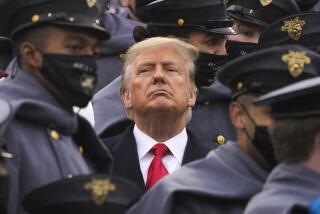Trading Liberty for Security
- Share via
Americans lost so much on that gorgeous, sunlit morning of Sept. 11, 2001. More than 3,000 mothers, fathers, sons and daughters. The belief, however chimerical, that this nation was invulnerable. A nation’s naivete about the wickedness that men will do. In the sad and anxious years since, there have been other losses, including one that has revealed itself more slowly: the steady erosion of civil rights.
The president and attorney general, from their first days in office, have pursued secrecy and restrictions on civil liberties. The terror attacks gave them a new rationale -- national security.
Three years later, the landscape of American liberties stands profoundly altered. The Patriot Act gives the government unprecedented new powers to snoop and arrest. Incorporated almost verbatim into the law’s 300 pages are wish lists that prosecutors drafted long before the attacks.
The act allows law enforcement officers to comb through people’s medical or financial data without their knowledge. If FBI agents ask, public librarians and booksellers must hand over records of their patrons’ reading habits; they can be prosecuted if they tell those targeted by such demands. The FBI can secretly collect information on businesses or charities it suspects of financing terrorism. Agents can far more easily seize books, journals or computers from someone’s home, membership lists from organizations, including churches and temples, and subscriber lists for any magazine.
Equally alarming, government investigators can now share surveillance information, collected in an effort to catch spies, with prosecutors looking to nab people suspected of dealing drugs or in other common crimes, even though espionage-related surveillance requests have to meet a much lower legal standard of suspicion.
The government’s secret “no-fly” list is full of errors, bumping innocent individuals from planes and trapping those who try to get their names expunged in an endless maze. The FBI continues to “invite” immigrants -- usually Middle Eastern men accused of no crime -- in for questioning. Before last month’s Republican National Convention, agents knocked on the doors of dozens of would-be protesters, visits clearly designed to intimidate them.
About 250 local governments and state legislatures, including the Los Angeles City Council, have passed resolutions calling for the Patriot Act’s repeal or amendment. Three years ago, federal lawmakers rushed to pass the massive legislation, and many now admit they didn’t read it first. Several pending bills would restore the civil rights protections that set the United States apart. The proposals would restrain secret fishing expeditions and require more openness, while still giving law enforcement ample tools to fight terror.
As the nation marks another sorrowful anniversary, Congress should begin to make those repairs.
More to Read
Sign up for Essential California
The most important California stories and recommendations in your inbox every morning.
You may occasionally receive promotional content from the Los Angeles Times.










